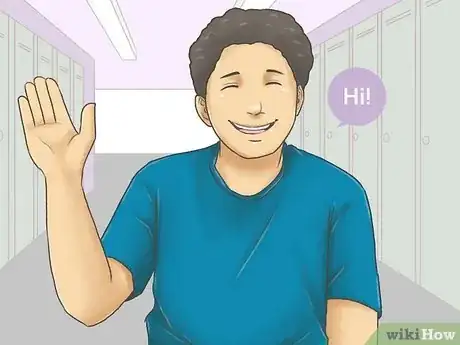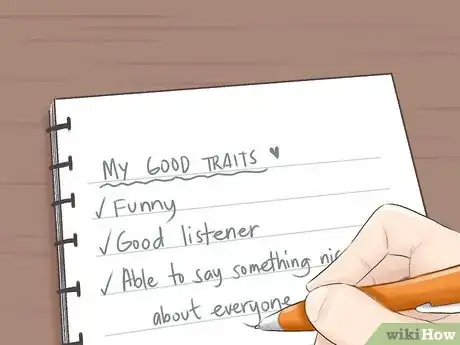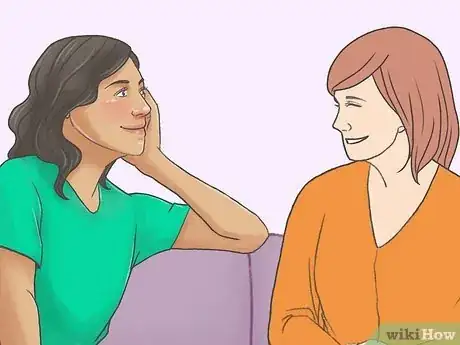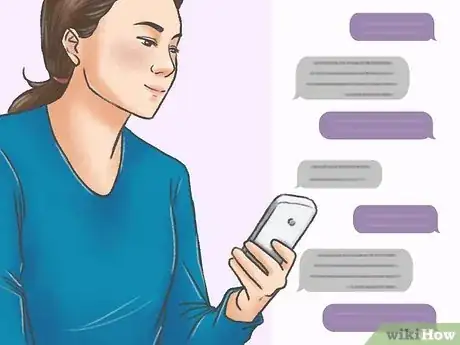This article was co-authored by Alicia Oglesby. Alicia Oglesby is a Professional School Counselor and the Director of School and College Counseling at Bishop McNamara High School outside of Washington DC. With over ten years of experience in counseling, Alicia specializes in academic advising, social-emotional skills, and career counseling. Alicia holds a BS in Psychology from Howard University and a Master’s in Clinical Counseling and Applied Psychology from Chestnut Hill College. She also studied Race and Mental Health at Virginia Tech. Alicia holds Professional School Counseling Certifications in both Washington DC and Pennsylvania. She has created a college counseling program in its entirety and developed five programs focused on application workshops, parent information workshops, essay writing collaborative, peer-reviewed application activities, and financial aid literacy events.
There are 13 references cited in this article, which can be found at the bottom of the page.
This article has been viewed 168,419 times.
Breaking out of your "shyness shell" takes a lot of courage. But, the possible rewards--new friends--are great. You can learn to meet new people by acting friendly so that people feel comfortable approaching you. It can also help to build up your confidence around other people. After that, keep your new friends around by being positive and kind.
Steps
Acting Friendly
-
1Smile at others. Smiling is the most important thing you can do to look friendly and approachable. When you catch someone’s eye or someone talks to you, smile – it lets the person know that you’re glad to interact, even if you don’t know what to say.[1]
- You don’t have to walk around wearing a grin all the time because that would be unnatural. Just practice keeping an open, pleasant expression on your face most of the time.
- You also don’t have to wait for others to initiate a smile. Don’t be afraid to make brief eye contact with people and to show your warmth.
-
2Say "hi". Go out of your way to greet people you’d like to be friends with. If you don’t know the person at all, introduce yourself and ask what the other person’s name is. Talking to someone you don’t know well might feel awkward if you’re not used to doing it, but most people will be happy to chat with you.[2]
- Have some things to talk about down pat, like the weather, a class you’re both taking, sports, or other “safe” topics. That way, you can gauge their interest before moving into deeper conversation.
- For example, you might say something like “Hey, what did you think of that homework assignment last night?” Or, “This weather has been great. I love fall, don’t you?”
Advertisement -
3Give a compliment. Saying something nice is always a good way to break the ice with a person you want to befriend. If you don’t know what to say, consider complimenting someone on their contributions to class discussions, their handwriting, or their outfit.
- For instance, you could say to your neighbor in class, “I love your pencil case. Where did you get it?”
-
4Ask people questions about themselves. One of the surest ways to make friends with someone is to be interested in them. Show that you’re interested by asking genuine (but not nosy) questions about your classmates’ hobbies, families, and favorite subjects at school. As an added benefit, you won’t have to talk so much when you encourage others to talk about themselves.[3]
- For instance, you could ask a classmate, “What kind of books do you like to read?” or “Do you have any brothers or sisters?”
-
5Practice talking to lots of people. Meeting new people might feel scary now, but the more you do it, the easier it will become. Set a goal to talk to one new person every week or every day. As you widen your social network and have more positive interactions with people, you’ll feel less nervous.[4]
- Joining an extracurricular activity like a sports team or drama club will give you lots of opportunities to practice talking to people.[5]
- If you feel comfortable, ask your family or friends to practice with you. Pretend that they’re strangers, then strike up a conversation and try to keep it going. The more you practice, the less nervous you’ll be to talk.
Building Confidence to Make Friends
-
1Think about your good traits. Ask yourself which of your personal qualities make you a great friend. Perhaps you’re funny, a good listener, or able to find something nice to say about everyone. Make a list of these traits and refer to it when you’re feeling shy or self-conscious.[6]
- If you’re struggling to think of traits, ask family members, friends, or loved ones to help. You might be surprised at the positive way they see you.
-
2Practice what you’re good at. Work on developing your skills and interests in your free time. Whether you’re into sports, art, or animals, having hobbies will give you things to talk about with other people, which can help you feel less shy. Being good at something will also help you develop strong self-esteem.[7]
- Hobbies can also give you a reason to get involved in clubs or groups, which is a good way to meet new friends.[8]
- Another way to develop hobbies and meet similar people is to start groups. Do you like chess, for example, but there isn’t a place to play at school? Maybe you could start a chess club at lunch.[9]
-
3Be who you are. Even if you’re shy, you don’t need to turn into a different person to make friends. Embrace your real personality, whether you’re reserved, goofy, or caring. Being genuine will help you make friends who appreciate your true self, shyness and all.[10]
- Being yourself doesn’t mean refusing to work on your negative traits. It just means owning and appreciating what makes you unique.
- It also means that you don’t need to compare yourself with others. Try to catch yourself if you notice that you’re trying to emulate other people.
-
4Think positively. Positive visualization and self-talk can help you feel less nervous about getting out and meeting new people. Imagine your encounters going well, and talk to yourself in an encouraging way, even if you mess up occasionally. [11]
- For instance, before you introduce yourself to someone, tell yourself, “I bet this person is friendly,” instead of, “I’m always awkward when I introduce myself to someone new.”
- Visualization helps you practice navigating different social scenarios before you actually encounter them.
-
5Rethink how you view rejection. Everybody gets rejected now and then, no matter how comfortable they are talking to people. If someone doesn’t want to talk to you, it doesn’t necessarily mean you did anything wrong, so don’t let a few bad encounters discourage you from trying to make friends.[12]
- For example, if someone isn’t open to talking to you, they might just be busy or worried about their home life. They could even be feeling shy, too.
- If you find yourself stewing over a rejection, make yourself think about a positive encounter you had instead.
Keeping Friends
-
1Be a good listener. Let your new friends know that you care about them by listening actively when they talk to you. Give them your full attention, for example. Don’t interrupt while they talk but face them, keep eye contact, and even ask questions about what they think and feel. Try to understand their experiences by stepping into their shoes.[13]
- Do your best to cheer up friends who’re feeling down. At the same time, though, don’t feel you need to give them advice unless they ask for it. Sometimes, people just want to be heard.
- Many shy people are great listeners, so if you have this skill, make the most of it.
-
2Have a positive attitude. People want to spend time with others who are positive and uplifting. Get into the habit of looking for the good side of every situation and every person you come across. If you are prone to complaining, tone it down, especially in the early stages of a friendship.[14]
- You don’t have to act fake or be happy all the time, but a positive mindset will help you attract and keep more friends.
- Encourage people around you, too! Being positive means celebrating others’ hard work, dreams, and accomplishments.
-
3Take it slowly. Let your friendships develop naturally over time. Don’t try to force closeness – you can’t become someone’s best friend in a week. Enjoy the time you spend with your new friends without becoming clingy or needy.[15]
- For instance, don’t start talking about your deepest personal issues if you’ve only known someone for a week or two.
- If you’re not sure how much to talk to your friends, try to mirror their level of involvement in the relationship. For instance, if they text you every day, it’s probably okay for you to text them every day, too.
Expert Q&A
-
QuestionHow do you encourage lonely or shy students to make friends?
 Alicia OglesbyAlicia Oglesby is a Professional School Counselor and the Director of School and College Counseling at Bishop McNamara High School outside of Washington DC. With over ten years of experience in counseling, Alicia specializes in academic advising, social-emotional skills, and career counseling. Alicia holds a BS in Psychology from Howard University and a Master’s in Clinical Counseling and Applied Psychology from Chestnut Hill College. She also studied Race and Mental Health at Virginia Tech. Alicia holds Professional School Counseling Certifications in both Washington DC and Pennsylvania. She has created a college counseling program in its entirety and developed five programs focused on application workshops, parent information workshops, essay writing collaborative, peer-reviewed application activities, and financial aid literacy events.
Alicia OglesbyAlicia Oglesby is a Professional School Counselor and the Director of School and College Counseling at Bishop McNamara High School outside of Washington DC. With over ten years of experience in counseling, Alicia specializes in academic advising, social-emotional skills, and career counseling. Alicia holds a BS in Psychology from Howard University and a Master’s in Clinical Counseling and Applied Psychology from Chestnut Hill College. She also studied Race and Mental Health at Virginia Tech. Alicia holds Professional School Counseling Certifications in both Washington DC and Pennsylvania. She has created a college counseling program in its entirety and developed five programs focused on application workshops, parent information workshops, essay writing collaborative, peer-reviewed application activities, and financial aid literacy events.
Professional School Counselor In my experience, when kids are reluctant to try and make friends, they'll do it at their own pace. It takes time. It can help to encourage them to join a club or try out for a sport. It's normally a lot easier for children to make friends when they have an activity to share with others.
In my experience, when kids are reluctant to try and make friends, they'll do it at their own pace. It takes time. It can help to encourage them to join a club or try out for a sport. It's normally a lot easier for children to make friends when they have an activity to share with others.
References
- ↑ http://www.upi.com/Science_News/2015/05/26/To-make-new-friends-simply-smile/6411432664844/
- ↑ https://tinybuddha.com/blog/11-ways-to-turn-strangers-into-friends/
- ↑ https://www.helpguide.org/articles/relationships-communication/dealing-with-loneliness-and-shyness.htm
- ↑ https://tinybuddha.com/blog/overcoming-shyness-how-to-feel-more-confident/
- ↑ Alicia Oglesby. Professional School Counselor. Expert Interview. 29 October 2020.
- ↑ http://au.reachout.com/what-makes-a-good-friend
- ↑ http://www.cyh.com/HealthTopics/HealthTopicDetailsKids.aspx?p=335&np=287&id=2285
- ↑ Alicia Oglesby. Professional School Counselor. Expert Interview. 29 October 2020.
- ↑ Alicia Oglesby. Professional School Counselor. Expert Interview. 29 October 2020.
- ↑ http://sydney.edu.au/news-opinion/news/2016/09/09/how-to-make-friends-at-university.html
- ↑ http://www.lifehack.org/articles/communication/ten-tips-for-shy-people-meet-friends.html
- ↑ http://www.huffingtonpost.com/2014/03/13/rejection-coping-methods-research_n_4919538.html
- ↑ http://www.huffingtonpost.com/max-dubowy/5-ways-to-make-friends-even-when-youre-shy-lonely-or-introverted_b_11689054.html
- ↑ https://www.psychologytoday.com/blog/hope-relationships/201409/6-ways-become-more-positive-today
- ↑ http://teens.webmd.com/features/friendships-make-keep-leave-them#1
About This Article
It can seem impossible to make friends in school when you’re really shy, but even the shyest people can learn to be friendly and comfortable talking to others! Try to smile whenever you can, since this will make you look friendly and approachable. You can also say a simple, “Hi, what’s your name?” to start a conversation with someone you don’t know. Alternatively, try breaking the ice with a compliment like, “I love your pencil case. Where did you get it?” If talking to someone you don’t know is too scary, consider joining an extracurricular activity, like a sports team or drama club. This will give you plenty of opportunities to practice talking to people. While it may seem scary at first, with enough practice you’ll get the hang of it! To learn how to boost your confidence so you can make friends, read more from our Social co-author!











































































